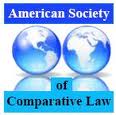Comparative Law Scholars Gather
 During the past week, comparative law scholars from around the world gathered in Washington, D.C. for the XVIIIth International Congress of Comparative Law. The International Congress is a quadrennial event that was this year sponsored by the International Academy of Comparative Law and the American Society of Comparative Law and was hosted by the law schools at Georgetown, George Washington, and American Universities.
During the past week, comparative law scholars from around the world gathered in Washington, D.C. for the XVIIIth International Congress of Comparative Law. The International Congress is a quadrennial event that was this year sponsored by the International Academy of Comparative Law and the American Society of Comparative Law and was hosted by the law schools at Georgetown, George Washington, and American Universities.
The seven-day conference began with a reception on Sunday evening and a Monday morning plenary session entitled “The Role of Comparative Law in Courts and International Tribunals” which featured speakers from the United States Eighth Circuit Court of Appeals, the Constitutional Court of Italy, the Inter-American Court of Human Rights, and the International Court of Justice as well as the current president of the American Bar Association and the Director of the Max Planck Institute.
A subsequent session featured Ruth Bader Ginsburg of the United States Supreme Court, and the concluding event, a plenary session focusing on the future of comparative law studies, entitled ”Comparative Law: Problems and Prospects,” was held on Saturday morning.
Once viewed as the province of specialists with little relevance to the practicing attorney, the field of comparative law has dramatically increased its role in the American law school curriculum in recent years. A number of law schools, including Harvard and Washington & Lee , have added Comparative Law to their first year curriculums. Others, like Marquette, have significantly increased the number of upper-level comparative law course offerings and have created special summer programs in comparative law in conjunction with law schools from other countries. In Marquette’s case, these programs have involved the University of Queensland (Australia) and, more recently, the Justus Liebig University Law School in Giesen, Germany.
Under the direction of Prof. Alan Madry, currently the director of Marquette’s program in International and Comparative Law, Marquette has also put together an array of opportunities for students to spend a semester or a year studying at a law school in another country.
Marquette was represented at the International Congress by Professor Hylton (yours truly) who serves as a member of the editorial board of the American Journal of Comparative Law. Also present was Professor James Nafziger of Willamette University Law School who served as the Boden Distinguished Visiting Professor at Marquette during the 2009-2010 academic year.


